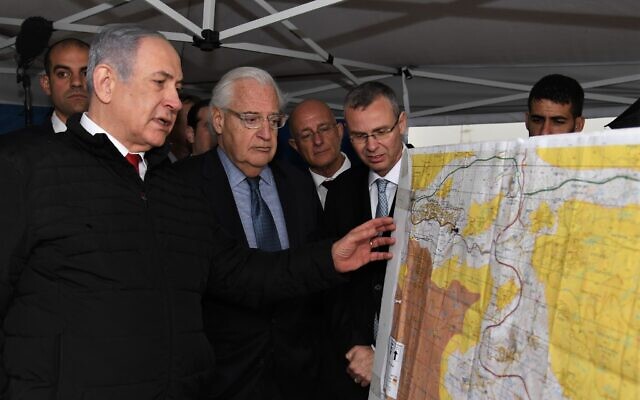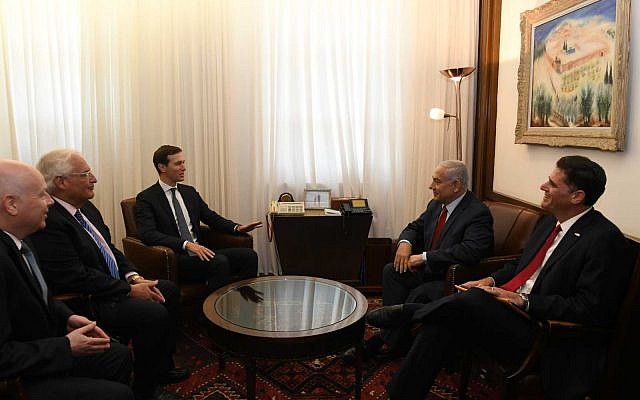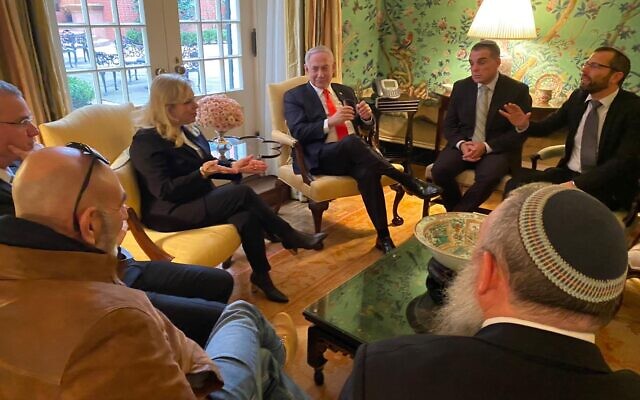Preparatory work set back by weeks, maybe even months, because of COVID-19 crisis, senior source tells ToI; Kushner visit to Jerusalem also seen as vital before finalizing process

The US administration is highly unlikely to approve an Israeli move to unilaterally annex parts of the West Bank by the July 1 date envisioned by Prime Minister Benjamin Netanyahu, a well-placed source told The Times of Israel on Wednesday.
In fact, it could take long weeks and possibly even several months before the joint US-Israel mapping committee concludes its work, which the White House has declared a precondition that must be met before it would give a green light for annexation, the source said.
The mapping committee is tasked with delineating the exact borders of the area Israel would apply sovereignty to — a difficult mission that requires meticulous on-the-ground-work, according to the source, who spoke to The Times of Israel on condition of anonymity.
However, one key member of the US side of the joint committee, the National Security Council’s Israel and Palestinian affairs director Scott Leith, has not been able to travel to the region since the outbreak of the coronavirus pandemic.
The mapping committee has not entirely suspended its work due to COVID-19, but officials involved in the process acknowledge that Leith’s presence would be necessary to complete the committee’s work. It is unclear when Leith could make his way to Israel, and even if he were to arrive here soon, it is unlikely that the committee could complete the complex task of defining the exact territory that Israel would be allowed to annex ahead of the July 1 date.
Further complicating Jerusalem’s efforts to quickly wrap up of the mapping committee’s work is the fact that the White House officials in charge of annexation file — senior advisor to President Donald Trump Jared Kushner and special envoy to the peace process Avi Berkowitz — have not been to Israel since before the administration’s peace plan was rolled out in January.
Sources familiar with the matter said that it was highly unlikely that the White House would support an Israeli annexation before the duo came to Jerusalem to discuss some outstanding issues.

Netanyahu told his Likud faction last week that he plans to initiate the annexation by July 1 — the earliest date the coalition agreement he signed with Defense Minister Benny Gantz’s Blue and White party allows him to bring the issue to a vote in either the cabinet or the Knesset.
According to the coalition deal, Israel can advance Netanyahu’s plan to apply sovereignty over the Jordan Valley and all settlements across the West Bank only in full coordination with the White House.
The Trump administration has vowed to recognize Israel’s annexation as long as Jerusalem does it on the basis of the peace plan issued by Washington earlier this year.
Since then, some Likud ministers have said that the plan would likely have to be delayed.
Ze’ev Elkin, for instance, said Sunday that there was no guarantee that the work of the mapping committee would be completed by July 1, and that annexation would likely have to wait “a few more days or weeks.”
“I know they’re working on the map, and that process could take some more time,” he said. “July 1 is the first day when the matter can be brought to the cabinet and the Knesset. It could possibly take a few more days or weeks, but generally I think the prime minister is very clear that he intends to advance this.”
Netanyahu on Monday discussed on a conference call the implementation of the so-called deal of the century, including the Israeli plan to annex 30 percent of the West Bank, with Kushner and Berkowitz. US Ambassador to Israel David Friedman and Israeli Ambassador to the US Ron Dermer participated as well.
Neither side issued a readout of the meeting, but Channel 13 cited unnamed American sources as saying that the administration officials were exploring precisely if and how Israel intends to proceed with unilateral annexation and came away from the conversations without a definitive answer.
Quoting a senior Israeli source, the TV report also said that the Americans “want to downplay the enthusiasm” for imminent annexation — “to greatly slow the process” — because the administration is preoccupied, among other matters, with nationwide protests following the killing of George Floyd by a policeman in Minneapolis last week, on top of the COVID-19 crisis and accompanying economic fallout.
On Tuesday, Netanyahu hosted in his Jerusalem office leaders from the settlement movement who are opposed to Trump’s peace plan because it endorses, in theory, the creation of a Palestinian state on the remaining 70 percent of the West Bank that Israel would not annex.

A settler official who took part in the meeting told The Times of Israel that Netanyahu indicated that the US was toughening its stance on annexation.
The official, who spoke on condition of anonymity, cited the prime minister as saying that the White House “may have lessened its enthusiasm about seeing sovereignty carried out.”
The official said settler leaders left the “intense” meeting under the impression that annexation would not be taking place “as soon or in the scope” that had initially been pledged by Netanyahu.
A readout of the meeting provided by the Prime Minister’s Office said that “discussions with the Americans are still ongoing,” apparently referring the work of the mapping committee.
As reported by The Times of Israel
